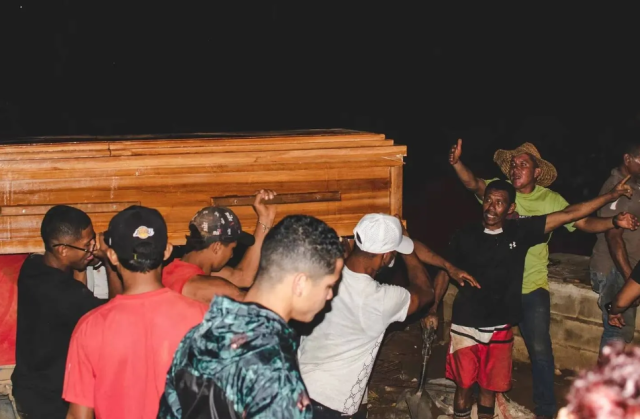
Local authorities said that the killed miners were operating in a site that had been shut down a long time ago.
By Venezuelanalysis – Andreína Chávez Alava
June 6, 2023
At least 12 artisanal miners died after heavy rains flooded a gold mine in southern Venezuela.
The tragedy took place last week in the Talavera mine, located in El Callao, Bolívar state. According to the governorship’s Citizen Security secretary Edgar Colina, the victims were men between ages 18 and 34 and their bodies have been rescued and returned to their families. Another 124 miners managed to escape before the place collapsed.
“Due to heavy rainfall, artisanal miners who were working there were trapped and died of asphyxiation. We have a total of 12 deaths,” said Colina on Saturday. He added that the Talavera mine had been shut down a long time ago but did not specify since when it had been operating under unregulated conditions without authorities’ knowledge.
The local official denied reports that other mines had suffered similar situations and clarified that the Isadora mine had no damages or victims and was being used by rescuers to access the neighboring Talavera mine.
According to local sources, most of the victims were from different regions across Venezuela and had migrated to mineral-rich Bolívar state. Small-scale mining has attracted thousands of people in recent years looking for better sources of income amidst the country’s economic crisis under US sanctions. Despite artisanal mining being legal, the practices have been criticized for lack of state supervision to guarantee safe conditions as well as for their environmental impact.
In a statement issued on Tuesday, Venezuela’s Communist Party (PCV) lamented the tragedy in the Talavera mine and questioned the circumstances in which it happened.
“We call on the authorities to initiate an investigation to establish the responsibilities for this tragedy and to explain why a closed mine was in operation”, said Maribell Díaz, member of the the party’s Political Bureau.
The Talavera mine is located in the Orinoco Mining Arc, an almost 112 thousand square kilometer area rich in mineral resources located in southeast Venezuela. In 2016, it was declared a Special Economic Zone by the Venezuelan government in order to carry out mega-mining projects frequently in alliances with foreign firms that are given sizable tax breaks.The declared purpose was boosting state income after the country’s oil industry started declining following the 2014 price crash.
However, the Mining Arc has been heavily criticized by both anti and pro-government groups for its dependence on foreign investment and open-pit mining practices as well as its negative consequences on local ecosystems and indigenous populations. Activists have also denounced that under the special economic status the region has become vastly deregulated, allowing illegal mining and smuggling activities to multiply.
Some of the most concerning issues have been large deforestation, water contamination and an increase in malaria cases as illegal mining leaves behind giant pools that help the proliferation of mosquitoes.
Venezuela’s expansive southeast area has long been the epicenter of illegal gold mining, which the government has unsuccessfully sought to reign in for decades. In 2010, former President Hugo Chávez implemented “Plan Caura” to combat this activity as it accounted for around 60 per cent of the country’s total gold production, according to Central Bank (BCV) figures. There is no official data presently.
Over the years, President Nicolás Maduro has likewise come up with similar initiatives to clamp down on illegal mining inside the Orinoco Mining Arc. The most recent effort was called “Operation Roraima,’ which was launched in December 2022 to combat illicit mining as well as human and drug trafficking. However, local sources have denounced that in vast parts of the region illegal gold miners have continued their activities undisturbed.
Venezuela has the world’s second largest gold reserves, but depends heavily on costly foreign assistance to process the material. In 2019, the US Treasury Department imposed sanctions on state mining company Minerven, which owns several gold-processing plants and produces gold bars from both state-run and small-scale independent mining operations. It belongs to the state-owned basic industry conglomerate Venezuelan Corporation of Guayana (CVG).
Under US sanctions, gold trade has become increasingly difficult and expensive with the government resorting to back-channels to procure sales or to pay for imports directly.
…
Read More: Venezuelanalysis – Gold Mine Collapse Leaves Several Dead in Southern Venezuela
…

